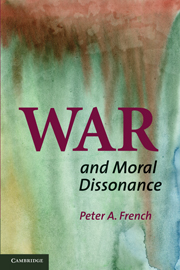Book contents
- Frontmatter
- Contents
- Preface
- 1 The Two-Collar Conflict
- 2 Our Better Angels Have Broken Wings
- 3 Responsibility for Innocence Lost
- 4 Virtuous Responses to Moral Evil
- 5 Assessing Attempts at Moral Originality
- 6 Public and Private Honor, Shame, and the Appraising Audience
- 7 Torture
- 8 Community and Worthwhile Living in Second Life
- 9 Of Merels and Morals
- 10 Inference Gaps in Moral Assessment
- 11 Blaming Whole Populations
- 12 The Moral Challenge of Collective Memories
- 13 Corporate Responsibility and Punishment Redux
- 14 Mission Creep
- Bibliography
- Index
- References
2 - Our Better Angels Have Broken Wings
Human Nature and the Nature of Evil
Published online by Cambridge University Press: 05 June 2012
- Frontmatter
- Contents
- Preface
- 1 The Two-Collar Conflict
- 2 Our Better Angels Have Broken Wings
- 3 Responsibility for Innocence Lost
- 4 Virtuous Responses to Moral Evil
- 5 Assessing Attempts at Moral Originality
- 6 Public and Private Honor, Shame, and the Appraising Audience
- 7 Torture
- 8 Community and Worthwhile Living in Second Life
- 9 Of Merels and Morals
- 10 Inference Gaps in Moral Assessment
- 11 Blaming Whole Populations
- 12 The Moral Challenge of Collective Memories
- 13 Corporate Responsibility and Punishment Redux
- 14 Mission Creep
- Bibliography
- Index
- References
Summary
The mystic chords of memory stretching from every battlefield and patriot grave to every living heart and hearthstone, all over this broad land, will yet swell the chorus of the organ when again touched, as surely they will be by the better angels of our nature.
Abraham Lincoln, First Inaugural AddressHuman Nature
“I have seen so much hell on my two deployments in Iraq that I’m finding it hard to believe that humans were made in the image of God, that we are essentially good. Satan can go on an extended vacation. We are more than wicked enough,” a chaplain who served with Marine units in Iraq told me at NSA Capodichino.
Many theologians and some moralists have defended conceptions of the basic or inherent goodness of humans. British moral sense theorists, notably Francis Hutcheson, contended that humans are naturally benevolent and are endowed with moral emotions or second-order affections and moral reactive attitudes that give rise to virtues and principles or standards of the morally good and bad. Hutcheson wrote:
The Author of nature…has made virtue a lovely form, to excite our pursuit of it, and has given us strong affections to be the springs of each virtuous action.…The Author of nature…has given us a MORAL SENSE, to direct our actions. And to give us still nobler pleasures: so that while we are only intending the good of others, we undesignedly promote our own greatest private good.…There is no such degree of wickedness in human nature, as in cold blood, to desire the misery of others, when it is conceived no way useful to our interests.…We have practical dispositions to virtue implanted in our nature.…There is a universal determination to benevolence in mankind.…Human nature is formed for universal love.
- Type
- Chapter
- Information
- War and Moral Dissonance , pp. 49 - 84Publisher: Cambridge University PressPrint publication year: 2010



